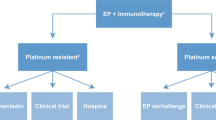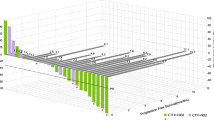Abstract
Etoposide is part of first-line chemotherapy for patients with small cell lung cancer (SCLC) and is one of the few cytotoxic drugs available in an oral formulation. There have been 3 major avenues of investigation of the role of oral etoposide in SCLC: the optimal schedule of administration, its potential as single agent therapy, and its incorporation into combination chemotherapy. Current evidence suggests that, in SCLC, the optimal schedule of administration is over 3 to 5 days. Its use as a single agent for palliation cannot be supported, but it has a continued use within combination chemotherapy for most patients. In addition, it is likely to be incorporated into regimens with new agents that may offer significant advantages over current combinations.
Similar content being viewed by others
References
Clark PI, Slevin ML. The clinical pharmacology of etoposide and teniposide. Clin Pharmacokinet 1987; 12: 223–52
Slevin ML, Clark PI, Joel SP, et al. A randomised trial to evaluate the effect of schedule on the activity of etoposide in SCLC. J Clin Oncol 1989; 7: 1333–40
Abratt RP, Willcox PA, de Groot M, et al. Prospective study of etoposide scheduling in combination chemotherapy for limited disease SCLC. Eur J Cancer 1991; 27: 28–30
Clark PI, Slevin ML, Joel SP, et al. A randomised trial of two etoposide schedules in small cell lung cancer: the influence of pharmacokinetics on efficacy and toxicity. J Clin Oncol 1994; 12: 1427–35
Clark PI, Slevin ML, Joel SP. A pharmacokinetic hypothesis for the clinical efficacy of etoposide in SCLC. Proc Am Soc Clin Oncol 1989; 8: 66A
Hainsworth JD, Johnson DH, Frazier SR, et al. Chronic daily administration of oral etoposide — a phase I trial. J Clin Oncol 1989; 7: 396–401
Johnson DH, Hainsworth JD, Hande KR, et al. Combination chemotherapy with oral etoposide. Semin Oncol 1992; 19 Suppl. 14: 19–24
Clark PI, Cottier B. The activity of 10-, 14-, and 21-day schedules of single-agent etoposide in previously untreated patients with extensive SCLC. Semin Oncol 1992; 19 Suppl. 14: 36–9
Carney DN, Keane M, Grogan L. Oral etoposide in SCLC. Semin Oncol 1992; 19 Suppl. 14: 40–4
Miller AA, Herndon JE, Hollis DR, et al. Schedule dependency of 21-day oral versus 3-day intravenous etoposide in combination with intravenous cisplatin in extensive stage small cell lung cancer: a randomized phase III study of the Cancer and Leukemia Group B. J Clin Oncol 1995; 13: 1871–9
Girling DJ. Comparison of oral etoposide and standard intravenous multidrug chemotherapy for small-cell lung cancer: a stopped multicentre randomised trial. Medical Research Council Lung Cancer Working Party. Lancet 1996; 348: 563–6
Clark PI, Thatcher N, Lallemand G, et al. Updated results of a randomised trial confirm that oral etoposide alone is inadequate palliative chemotherapy for small cell lung cancer. Lung Cancer 1997; 18: 14A
Souhami RL, Spiro SG, Rudd RM, et al. Five-day oral etoposide treatment for advanced small-cell lung cancer: randomised comparison with intravenous chemotherapy. J Natl Cancer Inst 1997; 89: 577–80
Johnson DH, Ruckdeschel JC, Keller JH, et al. A randomized trial to compare intravenous and oral etoposide in combination with cisplatin for the treatment of small cell lung cancer. Cancer 1991; 67 Suppl. 1: 245–9
Evans WK, Radwi A, Tomiak E, et al. Oral etoposide and carboplatin. Effective therapy for elderly patients with small cell lung cancer. Am J Clin Oncol 1995; 18: 149–55
Pfeiffer P, Sorensen P, Rose C. Is carboplatin and oral etoposide an effective and feasible regimen in patients with SCLC? Eur J Cancer 1995; 31A: 64–9
Wolff AC, Ettinger DS, Neuberg D, et al. Phase II study of ifosfamide, carboplatin and oral etoposide chemotherapy for extensive-disease small-cell lung cancer: an Eastern Cooperative Oncology Group pilot study. J Clin Oncol 1995; 13: 1615–22
Hainsworth JD, Gray JR, Stroup SL, et al. Paclitaxel, carboplatin and extended-schedule etoposide in the treatment of SCLC: comparison of sequential phase II trials using different dose-intensities. J Clin Oncol 1997; 15: 3464–70
Author information
Authors and Affiliations
Rights and permissions
About this article
Cite this article
Clark, P.I. Current Role of Oral Etoposide in the Management of Small Cell Lung Cancer. Drugs 58 (Suppl 3), 17–20 (1999). https://doi.org/10.2165/00003495-199958003-00003
Published:
Issue Date:
DOI: https://doi.org/10.2165/00003495-199958003-00003




